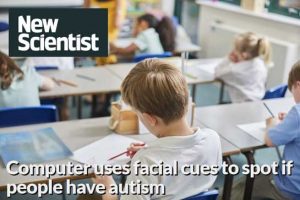Shared with us through our “Guest Contribution Form”
Here’s something I spotted as a news item in this week’s New Scientist magazine. Computers aren’t about to replace doctors any time soon but may be useful for confirmation of a diagnosis.
 AN ALGORITHM that analyses facial expressions and head movements could help doctors diagnose autism-like conditions and attention deficit hyperactivity disorder.
AN ALGORITHM that analyses facial expressions and head movements could help doctors diagnose autism-like conditions and attention deficit hyperactivity disorder.
There is no simple test for autism or ADHD, but clinicians usually observe someone’s behaviour as part of the assessment. “These are frequently co-occurring conditions and the visual behaviours that come with them are similar,” says Michel Valstar at the University of Nottingham, UK.
His team used machine learning to identify some of these behaviours. The group captured video of 55 adults as they read and listened to stories and answered questions about them. “People with autism do not always get the social and emotional subtleties,” says Valstar.
READ THE FULL ARTICLE…Share This Post:







I found this a very interesting article, although find my Self having conflicting feelings about it. Personally, it seems a little like the promotion of “medicalising more” that which I now perceive as a “cognitive state”.
It also appears to be based upon “behavioural patterns”, which again creates a form of “cognitive dissonance”, as I believe it is true that no single behaviour can indicate the “Non-Neuro-Typical”, whilst at the same time personally observing “similarities shared” with others “on the spectrum”.
I’m not saying either of these positions are “good or bad” (if indeed I have even interpreted the article “correctly”). Again, personally I do not wish Autism to become “non-medical” and cease to be a “condition” or “disorder” as for me it is both of these things. But at the same time, I do not believe “Autism” to be an “illness” per se.
That said, I DO believe that this “neurological divergent thought process” as perhaps being more susceptible to “comorbidities” (anxiety, depression etc. which I DO consider “mental illness” and are worthy of being addressed).
Perhaps paradoxical in my mind at the moment, as I said, very interesting article, fuel for thought.
Dear Professor Valstar,
Re. New Scientist 7th January 2017 page 11 ‘Computer Spots Signs of Autism and ADHD’
As a scientifically trained adult with autism I was interested in Matthew Reynolds’ news article. Last summer I had an idea relating to a similar topic. Many autistic individuals have a mouth focus when conversing with others. Our eyes are naturally drawn to the mouth rather than the eyes of the conversation partner. Perhaps this would be an additional tool which could be used by your team.
Yours sincerely,
Martin Reynolds
——————————
Dear Martin,
This is a very interesting thought. I have a friend who is an ophthalmologist who has similar ideas. We will discuss this to see if we can add it to our cues for analysis.
Kindest regards,
Michel